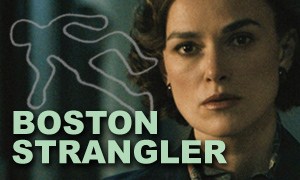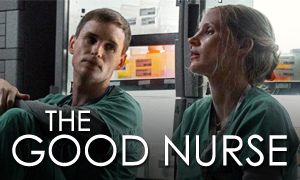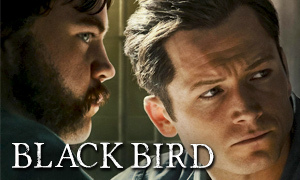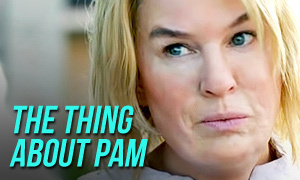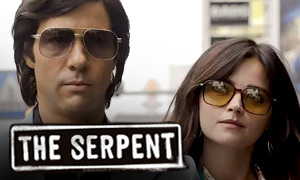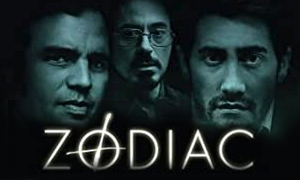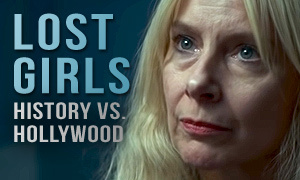Extremely Wicked, Shockingly Evil and Vile: History vs. Hollywood
| REEL FACE: | REAL FACE: |
Zac Efron
Born: October 18, 1987 Birthplace: San Luis Obispo, California, USA | Ted Bundy
Born: November 24, 1946 Birthplace: Burlington, Vermont, USA Death: January 24, 1989, Florida State Prison, Bradford County, Florida, USA (Execution by Electric Chair) |
Lily Collins
Born: March 18, 1989 Birthplace: Guildford, Surrey, England, UK | Liz Kloepfer
Ted Bundy's Girlfriend |
Angela Sarafyan
Born: June 30, 1983 Birthplace: Yerevan, Armenian SSR, USSR (now Armenia) | Marylynne Chino
Born: February 16, 1945 Renamed Joanna in the movie |
John Malkovich
Born: December 9, 1953 Birthplace: Christopher, Illinois, USA | Judge Edward D. Cowart
Born: February 17, 1925 Birthplace: Plant City, Florida, USA Death: August 3, 1987, Miami-Dade County, Florida, USA |
Kaya Scodelario
Born: March 13, 1992 Birthplace: Holloway, London, England, UK | Carole Ann Boone
Born: August 8, 1954 Birthplace: USA Bundy's Wife |
Jim Parsons
Born: March 24, 1973 Birthplace: Houston, Texas, USA | Larry D. Simpson
Florida Prosecutor |
James Hetfield
Born: August 3, 1963 Birthplace: Downey, California, USA | Robert "Bob" Hayward
Born: November 18, 1926 Birthplace: Salt Lake City, Utah, USA Death: August 5, 2017 Ted Bundy's Arresting Officer |
Grace Victoria Cox
Born: March 10, 1995 Birthplace: Lexington, Kentucky, USA | Carol DaRonch
Born: abt 1956 Birthplace: Utah, USA Survivor |
What did Ted Bundy study in college?
In researching the Extremely Wicked, Shockingly Evil and Vile true story, we learned that Bundy obtained a degree in psychology from the University of Washington and went to graduate school at the University of Utah Law School in Salt Lake City. He would later use his background in law to defend himself at his murder trial.
When did serial killer Ted Bundy commit his first murders?
Women began disappearing in Seattle and surrounding areas as Bundy was finishing his undergraduate degree at the University of Washington in 1972. His earliest identified victim was murdered in Washington on January 31, 1974. Reports indicate that the women were last seen with a man named Ted. The trend continued when Bundy moved to Utah for his graduate degree in 1974.
Did Ted Bundy really meet girlfriend Liz Kloepfer at a college bar?
Yes. In the movie, we see Bundy (Zac Efron) meeting secretary Liz Kloepfer (Lily Collins) for the first time at a Seattle college bar in 1969. The real bar was the Sandpiper Lounge. Like in the film, Kloepfer was a single mom of a young daughter named Tina. Kloepfer became Bundy's domestic partner during the years that he was establishing himself as a prolific serial killer. They remained together for seven years. However, according to Ann Rule's book The Stranger Beside Me, Bundy dated "at least a dozen" other women while attending law school in Utah. Kloepfer dated other people as well.
In the Netflix Ted Bundy movie, is Liz Kloepfer's best friend Joanna based on a real person?
Yes. Joanna (Angela Sarafyan) was likely inspired by Marylynne Chino, Liz's best friend at the time, who was at the bar with her when she met Bundy. "He'd leave in the middle of the night when he was with Liz," says Chino. "Well, if somebody was at my house and they left and came back, I'd certainly question that. You know, what are you going out in the middle of the night for?" When Liz showed Marylynne the police sketch in the newspaper, she immediately recognized it as Bundy, at which point Liz burst into tears. They reported their suspicions to the police but were ignored.
Did Ted Bundy lure his victims by feigning an injury or pretending to be an authority figure like a police officer?
Yes. A 1992 multi-agency team report directed by the U.S. Department of Justice confirms what's seen in the Ted Bundy movie. The report states, "He would feign an injury and indicate he needed assistance or he would portray an authority figure such as a police officer. He thus persuaded the victim to voluntarily accompany him to his tan Volkswagen Beetle where he had secreted a crowbar near the rear of the vehicle.
Upon reaching the vehicle, he would retrieve the crowbar and strike the victim over the head, rendering her unconscious. He would then handcuff her and place her in the passenger side of the vehicle, which he had modified by removing the seat." The report was based on interviews with Bundy while he was on death row.
Did Ted Bundy rape his victims?
Yes. The Extremely Wicked, Shockingly Evil and Vile true story confirms that Ted Bundy did rape many of his victims. However, it is unlikely that he committed only rapes. According to the 1992 Department of Justice report, "He was interested sexually in semiconscious or unconscious victims."
Survivor Rhonda Stapley recounted him choking her to the point she was in and out of consciousness. He raped her repeatedly, and when he momentarily went back to his car (likely to retrieve his murder kit), she fled and fell into a mountain river, which swept her far enough away from him to save her life. Rhonda shares her harrowing story in her book I Survived Ted Bundy.
How many women did Ted Bundy murder?
Like in the movie, the Extremely Wicked true story confirms that Bundy confessed to the murders of 30 females. However, his attorney, John Henry Browne, and others have stated that he could have killed as many as 100 women between 1973 and 1978, in addition to one man.
"We may never know the total extent of his devastation," said former FBI Director William S. Sessions in 1992. Bundy's killing spree stretched across the country; he confessed to murdering 11 people in Washington, one in California, two each in Idaho and Oregon, three each in Florida and Colorado, and eight in Utah. -People
Did a dog bark viciously at Ted Bundy?
No. In the movie, Ted and his girlfriend Liz go to the pound to look at dogs. A dog they're considering locks eyes with Ted and begins to bark viciously, which the couple later jokes about. This warning sign never happened in real life. Director Joe Berlinger said that the scene is fiction and that he did his "own interpretation of having some clues along the way."
Did Ted Bundy really have genuine feelings for girlfriend Liz Kloepfer?
Yes. The true story reveals that Ted Bundy's attachment to Liz Kloepfer in the movie is accurate. According to Kloepfer's 1981 memoir The Phantom Prince: My Life With Ted Bundy, his affection was genuine and he even panicked at the notion of losing her after he was arrested.
Did Ted Bundy go back to his crime scenes?
Yes. According to the Department of Justice report, Ted Bundy made return trips to all of his crime scenes.
Did Ted Bundy's girlfriend, Liz Kloepfer, really believe that he was innocent throughout his arrests and trials?
Yes, and it is for this reason that we don't see any of the murders in the film until the movie's final minutes, at which time the truth is revealed to Liz. However, like in the film, despite Ted insisting he was innocent, Liz did have her doubts which she attempted to drown in alcohol. What's left out of the movie is that Liz noticed a few clues along the way that made her scratch her head. This included seeing crutches in Bundy's home (news reports described the suspect as having used a crutch to knock out a victim), him taking a crowbar from her house, her discovering a hatchet under the passenger seat of his car, and her finding plaster of Paris in his desk drawer (reports stated that the suspect used it to make an arm cast).
The Netflix Ted Bundy movie is based on Liz Kloepfer's book, The Phantom Prince: My Life with Ted Bundy, which she wrote under the pseudonym Liz Kendall. During Ted Bundy's execution interview, the serial killer said that he was "essentially a normal person." He had friends, a girlfriend, and was seemingly like everyone else.
Where did the title "Extremely Wicked, Shockingly Evil and Vile" come from?
The title of the Ted Bundy movie is a reference to remarks made by Judge Edward Cowart (John Malkovich in the film) while sentencing Bundy to death. He called Bundy's murders "extremely wicked, shockingly evil and vile."
Did Bundy give Liz the French prison-escape novel Papillon as a gift?
No. In the movie, Bundy keeps telling Liz about author Henri Charrière's prison-escape novel Papillon. He even gives it to her as a gift when she comes to visit him in prison. In real life, Liz never mentions Papillon in her memoir. Instead, it seems to be a symbolic element added to the movie to give Ted hope that he will one day get out of prison.
Did Ted Bundy escape by jumping from a second-floor courthouse window?
Yes. It might seem far-fetched, but in examining the Extremely Wicked true story, this actually happened. Ted Bundy was taken into custody in 1975 and was convicted of the kidnapping and attempted murder of Carol DaRonch. Several months into his prison sentence, he was charged with the murder of a Colorado woman named Caryn Campbell. The murder trial was held in Aspen, Colorado and Bundy was transferred to Garfield County jail in Glenwood Springs, Colorado prior to the start of the trial. He managed to escape by jumping from a second-floor courthouse library window while acting as his own attorney. He was recaptured eight days later.
Did Ted Bundy really escape twice?
Yes. Just six months after his leap out of the Aspen courthouse window, he escaped from jail in Glenwood Springs using a hacksaw blade given to him by other inmates. He had cut a one-foot square in the steel reinforcing bars in his cell's ceiling and was able to wiggle his way into the crawl space above. Though it's not shown in the movie, Bundy had spent four months losing roughly 35 pounds in order to fit through the ceiling crawl space. He appeared gaunt at the time. Yet, we see no weight change in Zac Efron's character in the film.
Bundy escaped on the night of December 30, 1977 while most of the jail staff was on Christmas break. He piled books and files under his covers to make it look like he was sleeping, and it took guards until noon the following day to realize he was missing. He took a bus to Denver, flew to Chicago, and eventually made his way to Tallahassee, Florida. As indicated in the Netflix Ted Bundy movie, it was there that he committed some of his most savage acts of murder.
Is Haley Joel Osment's character, Jerry, based on a real person?
No. "Jerry is an invented character who is just sort of in the position of trying to pull Liz out of the Bundy black hole," Osment said at Sundance, "and to sort of try to get her to envision a life beyond him" (IMDb). While there was no real colleague named Jerry who she turned to, in her memoir, she eventually confides in a man she calls Hank who she met at an Alcoholics Anonymous meeting.
How was Ted Bundy captured?
Like in the Extremely Wicked, Shockingly Evil and Vile movie, the true story confirms that Ted Bundy was captured following his murder spree in Florida when Pensacola police officer David Lee noticed that Bundy's Volkswagen Beetle was stolen. After being told he was under arrest, Bundy kicked Lee's legs out from under him and took off running. Lee fired two warning shots and gave chase, tackling Bundy. They wrestled for Lee's gun but Lee subdued him and took him into custody. In Bundy's Volkswagen were the IDs of three female FSU students, in addition to other stolen items.
Did bite marks on one of his victim's buttocks do him in?
Yes. Bundy inflicted the bite marks during his murderous 1978 killing spree at Florida State University's Chi Omega sorority house, where he bludgeoned four women with a piece of oak firewood. Two of the women died from their injuries and authorities were able to match bite marks on one of the deceased women's buttocks to castings of Bundy's teeth.
Why did it take so long for Ted Bundy to be caught for his murders?
Even though the 1970s weren't that long ago, forensic science has come a long way since then. For example, DNA profiling wasn't used by law enforcement until the late 1980s (it was first accepted as admissible in U.S. courts in 1988), roughly a decade after Bundy's final arrest.
Did admirers really ask Bundy to autograph his own 'Wanted' posters?
Yes. Bundy very much took on the persona of a celebrity, and as mentioned in the movie, the Extremely Wicked true story confirms that admirers did ask him to autograph his own 'Wanted' posters.
Did Ted Bundy represent himself during his murder trial in Florida?
Yes. In performing our fact-check of the Extremely Wicked, Shockingly Evil and Vile Ted Bundy movie, we confirmed that this part of the film is largely accurate (in part because there is footage of the trial). The former law student acted as his own attorney after brushing his state-appointed council aside. It was the first nationally televised trial in America and Bundy became the star of the show. He indeed wore a blue blazer and a large, dark bowtie, as if he was a performer (or a used car salesman) ready to sell the audience on his innocence.
Did Ted Bundy really propose to Carole Ann Boone while he was on trial?
Yes. Carole Ann Boone was an old friend of Bundy's from his days working at the Department of Emergency Services in Olympia, Washington. They had worked there together for six years. During his 1979 murder trial in Florida, Bundy, who was representing himself, questioned Boone about their relationship. It was at that time that he straight-up asked her if she wanted to marry him. She said yes. See footage of Ted Bundy's courtroom proposal. Their daughter, Rose, was conceived in prison and was born in 1981/1982. She is believed to be Bundy's only child. Boone divorced Bundy in 1986, three years prior to his execution.
Did Ted Bundy really tell Liz Kloepfer the truth in person?
No. Director Joe Berlinger admitted that the in-person encounter at the end of the film is fictional. Ted Bundy actually revealed the truth to former girlfriend Kloepfer during a phone call, not in person at the prison. "The phone call is far less dramatic than a final real-life confrontation," Berlinger told Collider at Sundance, "but the emotional truth of what occurred in that conversation, whether it's done in person or versus a phone, you're going for the same emotional truth. That's my philosophy anyway."
According to Kloepfer, unlike the movie, Bundy never directly admitted his guilt to her. He told her that "there is something the matter with me ... I just couldn't contain it. I've fought it for a long, long time ... it got too strong." When she asked him to clarify, he responded, "Don't make me say it." He never did and the phone call ended.
Did Ted Bundy ever try to kill girlfriend Liz Kloepfer?
Yes. In real life, Kloepfer asked Bundy this during their final phone conversation. He admitted that he once closed the damper on her chimney so that the smoke couldn't escape while she was sleeping off a night of drinking. Before he left the house, he also put a towel against a door to further trap the smoke. In her memoir, Kloepfer says that she remembers waking up coughing.
When was Ted Bundy executed?
For his crimes in the state of Florida, Ted Bundy was executed by way of Florida's electric chair on January 24, 1989 at age 42.
Ted Bundy Murder Trial Footage & Final Interview
Watch Ted Bundy take the stand in this footage from his 1979 murder trial in Florida. Also witness Judge Edward D. Cowart deliver Ted Bundy's death sentence.
